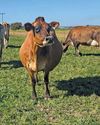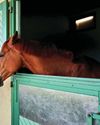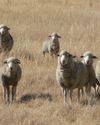Intentar ORO - Gratis
Following the herd to help reduce emissions
Farmer's Weekly
|November 10, 2023
Identifying and including a low-methane trait in livestock breeding programmes could be the answer to the methane problem faced by animal farmers globally. But how conclusive is the research and will it impact production traits? Lindi Botha reports.

For most South African farmers, surviving the cost-price squeeze is a far greater consideration than reducing methane emissions. While South Africans are not currently facing pressure to reduce carbon footprints like Europe and the US, emissions will need to be tackled in the near future. Considering the pressure the livestock industry faces globally for their methane emission contribution to greenhouse gases (GHG), it is expected that SA farmers will not be spared the scrutiny.
The good news is that, as the focus on methane emissions from livestock production has intensified, so has research to reduce methane production in livestock. And as gene sequencing has become common among breeders to select the right qualities for their herd, genes that reduce methane are under the spotlight.
About 90% of methane from cows is excreted by burping rumen gases from their mouths. This is a rumen fermentation by-product and is often referred to as enteric methane emissions. Multiple studies now show that the cow’s genetic make-up accounts for 24% of methane emission variation, with another 7% attributed to the rumen microbiome. Determining what genes affect rumen gases, and what effect these genes will have on production if deselected, has become a burning question, and one that requires far more research before conclusions can be drawn.
The Food and Agriculture Organization of the United Nations’ (FAO) report on methane emissions in livestock, published in September this year, states that at present there are only a few instances where methane is taken into consideration in breeding programmes across the world.
FAST FACTS
Genetics and the gut microbiome play a big role in methane production in cows.
Esta historia es de la edición November 10, 2023 de Farmer's Weekly.
Suscríbete a Magzter GOLD para acceder a miles de historias premium seleccionadas y a más de 9000 revistas y periódicos.
¿Ya eres suscriptor? Iniciar sesión
MÁS HISTORIAS DE Farmer's Weekly
Farmer's Weekly
Farmers 'unilateral victims' of climate
Gyeongbuk Provincial Council member Choi Taerim has demanded immediate and substantial support for apple farmers in the South Korean province, urging immediate measures for apple farmers affected by heat damage be implemented, The Asia Business Daily recently reported.
1 min
November 21-28, 2025

Farmer's Weekly
Top agri workers celebrated in the Western Cape
Shannon Robertson, assistant livestock manager at Boschendal near Franschhoek, was crowned the overall winner of the 2025 Western Cape Prestige Agri Awards, held in Durbanville.
1 min
November 21-28, 2025

Farmer's Weekly
Smart dairying: running Jerseys on pasture
The dairy farming sector has seen innovation in milk parlour and cow comfort technology that have allowed farmers to not only yield higher volumes, but extend the productive lifespan of their cows. Albrecht de Jager told Henning Naudé about his approach to maintaining a pasture-raised Jersey herd while utilising precise data measuring technology to ensure quality milk output and optimal cow comfort.
6 mins
November 21-28, 2025

Farmer's Weekly
High-performance dairy farming in the Eastern Cape: the Rufus Dreyer approach
Dairy farming is often described as one of the most technically demanding and strategically complex branches of agriculture.
6 mins
November 21-28, 2025

Farmer's Weekly
Design your stables and camps to assist in AHS control
Keep horses away from areas where disease-carrying midges multiply, like natural pools, lakes, streams and dams, advises Dr Mac.
2 mins
November 21-28, 2025

Farmer's Weekly
The rolling chant that has echoed through SA over the past 30 years
Johan van der Nest is renowned in auction circles and was the first freelance stud-stock auctioneer to begin operating in South Africa.
10 mins
November 21-28, 2025

Farmer's Weekly
Flight from the Red Army
The fall of the Third Reich in 1945 was defined by the Red Army's brutal invasion of Germany. Mike Burgess tells how the Hoppe family trekked from Finowfurt near Berlin to Preetz in Schleswig-Holstein to escape the brutality.
6 mins
November 21-28, 2025

Farmer's Weekly
How to plan a pre-sale feeding programme
Proper feeding of animals before a sale can help producers catch the eye of buyers and increase profits, but it is important to choose the right ration.
8 mins
November 21-28, 2025

Farmer's Weekly
How women are transforming coffee production in Kenya
A group of Kenyan smallholder women farmers are transforming the country's high-value coffee sector by pooling their resources.
5 mins
November 21-28, 2025

Farmer's Weekly
Tough times ahead for SA's grain farmers
Grain farmers face a difficult year ahead with lower grain prices and high production costs
3 mins
November 21-28, 2025
Translate
Change font size

